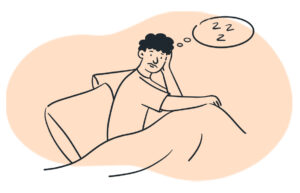Exploding Head Syndrome
Disclosure: By clicking on the product links in this article, Mattress Nerd may receive a commission fee at no cost to you, the reader. Read full disclosure statement.
Exploding head syndrome (EHS) is a sleep disorder that causes a sleeper to wake up perceiving they heard a loud sound even though there was no external noise. It’s considered harmless, but the symptoms can still be frightening and disruptive when they occur.
Exploding head syndrome remains something of a mystery to the medical community, but recent research has uncovered some possible explanations.
It’s important to note that EHS can be distressing, but it’s painless. If you’re in severe pain and feel like your head is exploding, seek medical attention immediately.
What is Exploding Head Syndrome?
Exploding head syndrome is a sleep disorder that causes people to hear sudden, loud noises when their body is in a sleep stage that’s between wakefulness and sound sleep. These sounds wake them up and can be frightening, but they’re not painful. The sound only lasts a second or two, and people describe what they heard as:
- Explosions
- Gunshots
- Thunder
While these noises are not from an external source and no one else can hear them, they can be extremely loud and distressing. People with EHS may also see flashes of light or experience muscle jerks along with the noise.
EHS is considered a harmless condition that isn’t a danger to your overall health. It’s also believed to be rare, but some poeple experience episodes frequently enough that they disrupt their sleep patterns. For most, however, episodes are infrequent and don’t cause lasting negative effects.
Causes
Scientists haven’t determined a cause for EHS yet, but multiple theories exist. Some believe that the condition is linked to a dysfunction in the brainstem that’s responsible for transitioning the brain from wakefulness to sleep.
If the part of your brain that processes sound doesn’t power down correctly, researchers predict this could result in a “burst of neural activity.” So while the rest of your noggin is shutting down for the night, this sudden jolt could make you “hear” a loud noise.
Here are some other possible triggers:
- Inner ear damage or dysfunction
- Migraine
- Suddenly stopping medication for depression ( like selective serotonin reuptake inhibitors) or anxiety (like benzodiazepines)
- Stress
- Anxiety
More research is needed to determine the prevalence of this condition. Historically, scientists have viewed it as a rare disorder that primarily affects women and older folks. But one study found that 16 percent of a sample of college students reported having EHS.
Symptoms
The main symptom of exploding head syndrome is the sensation of a loud noise going off in your head. However, you may experience other symptoms, like:
- Seeing flashes of light
- Muscle jerks
- Rapid heartbeat
- Trouble breathing
- Sweating
- Anxiety
- Difficulty falling back asleep
Remember, physical pain is not associated with exploding head syndrome. If you’re in so much pain that it feels like your head is exploding, seek medical attention right away.
Treatment
There’s no evidence that exploding head syndrome causes long-term effects or damage, but the symptoms can be unpleasant. If EHS is disrupting your quality of life, talk to your doctor about treatment options.
There’s no specific cure for exploding head syndrome, but there are things you can do to manage your symptoms. In some cases, you may be prescribed a medication that’s used for other conditions but has shown promise for treating EHS. These include:
- Topiramate: an anti-seizure medicine
- Nifedipine: a heart disease drug
- Amitriptyline: an antidepressant
- Clomipramine: a drug used to treat obsessive-compulsive disorder
Prevention
The best way to manage exploding head syndrome is to prioritize your overall sleep hygiene. That means:
- Getting the recommended 7 to 9 hours of sleep every night.
- Practicing calming and relaxation techniques like stretching, yoga, warm baths, or meditation. This is especially helpful if you notice that stress triggers your episodes.
- Creating and sticking to a regular sleep schedule, even on weekends.
- Limiting your caffeine consumption.
- Adjusting your sleep environment to make it dark, quiet, and comfortable.
- Treating any other underlying sleep disorders like sleep apnea, insomnia, or restless legs syndrome.
Takeaway
The jarring symptoms of exploding head syndrome can be alarming, but it’s not linked to any long-term health conditions.
If EHS is disrupting your sleep on a regular basis, talk to your doctor about treatment options and focus on creating healthy sleep habits to reduce the frequency of your episodes. With a little proactive care, you can get back to enjoying a good night’s rest.
Source List
Cox, S. (2020). ‘Exploding Head’ study reveals hopes and fears of sufferers. https://www.gold.ac.uk/news/exploding-head-syndrome/
Exploding Head Syndrome (EHS). (2021). https://my.clevelandclinic.org/health/diseases/21907-exploding-head-syndrome-ehs
How Much Sleep Do I Need? (2022). https://www.cdc.gov/sleep/about_sleep/how_much_sleep.html
Khan I, et al. (2022). Exploding Head Syndrome. https://pubmed.ncbi.nlm.nih.gov/32809652/
Pirzada, AR. (2020). Exploding Head Syndrome: A Case Series of Underdiagnosed Hypnic Parasomnia. https://www.karger.com/Article/Fulltext/509344


